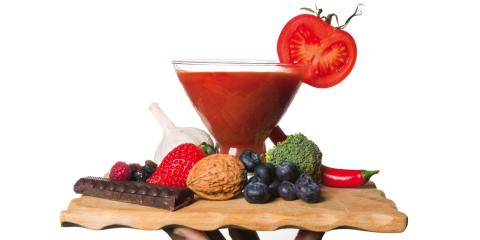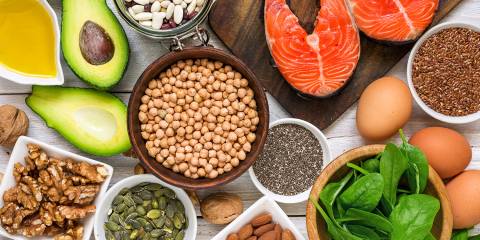Today, a balanced diet encompasses a wide range of options, including whole grains, legumes, seeds and nuts, fish, and plant oils like olive oil.
Grow Old Gracefully with Food
To grow older gracefully through healthful food choices, the American Dietetic Association suggests the following:
Try moving away from three big meals a day to smaller, more frequent meals; plan for easier, low-preparation meals; focus on consuming the nutrients your body needs; and experiment with changes to improve your eating habits.
Aging well is easier than you think—and can be supported by five “super” foods that may already be among your favorites.
-
Fish to Feed your Brain
The old adage that fish is brain food is remarkably true. Margaret M. Wittenberg, author of New Good Food: Essential Ingredients for Cooking and Eating Well, recommends that healthy adults eat at least two 3-ounce servings of seafood a week, particularly those varieties high in two long-chain, polyunsaturated omega-3 fatty acids: eicosapentaenoic acid (EPA) and docosahexaenoic acid (DHA). These healthy fats have been shown to diminish the overall risk of cardiovascular disease in adults. EPA and DHA may also support mental health by helping to reduce depression and neuropsychiatric disorders.
-
Juicy Fruits for Vitamin C
Citrus fruits such as oranges, grapefruits, and tangerines are well-known sources of vitamin C. This powerful antioxidant helps fight free radicals that contribute to aging and is necessary for healthy tissue growth and collagen formation. Since the body doesn’t make or store vitamin C, it’s essential to get an adequate supply from the diet every day.
C-rich citrus also contains phytochemicals that may provide some protection against pancreatic, breast, and prostate cancers. Additionally, according to the World Health Organization, a diet that features citrus fruits may offer protection against cardiovascular disease.
-
Defend Yourself from Cancer with Leafy Greens
The cruciferous vegetable family includes bok choy, broccoli, cabbage, cauliflower, and kale. The American Institute for Cancer Research reports that clinical studies suggest that cruciferous vegetables assist in regulating “a complex system of bodily enzymes that defend against cancer.” This shielding effect appears strongest for cancers of the mouth, pharynx, larynx, esophagus, and stomach.
Broccoli and cruciferous veggies are abundant in a compound called sulforaphane, shown to provide protective benefits to colon and other cells. In one laboratory study, researchers found that sulforaphane significantly reduced the proliferation of colon cancer cells.
-
Beans and Legumes to the Rescue
Plant proteins including beans, peas, and lentils—are among the most nutritious foods you can eat. Typically, legumes contain little fat, no cholesterol, and are good sources of folate, potassium, iron, and magnesium. As useful sources of protein, they can also be a healthy replacement for meat, which has more fat and cholesterol.
Legumes are also rich in fiber. “Collectively,” says Wittenberg, “all of the nutrients and fiber in beans have been found to work together to help reduce the risk of heart disease and certain cancers.” She adds, “Resistant starch, also categorized as an element of dietary fiber, is present in beans at significantly higher percentages than in many other foods, even grains.
-
Dark Chocolate for Antioxidant and Immune Protection
Just like rust on a car, oxidation can cause damage to cells and contribute to aging. More than just a buzz word for healthy living, antioxidants help prevent oxidation; they may also boost immune function and possibly decrease risk of infection and cancer. Flavonoids, natural antioxidants found in many plant foods, play an important role in an overall healthy diet. Limit your daily intake to a small serving (about 2 ounces) of flavonol-rich dark chocolate.




